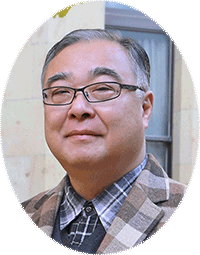Greetings from the President of the Japanese Palaeolithic Research Association

Prof. Dr. Hiroyuki Sato
July 8, 2020
Due to the recent spread of coronavirus infectious diseases, it was unavoidable that this year's general meeting was canceled, and instead, a written decision on the general meeting items was held at the end of June. I am Hiroyuki Sato, who was newly elected as a president after the former president of Prof. Kaoru Akoshima as a result of this written decision. I am a professor of the Department of Archaeology, Graduate School of Humanities and Sociology, the University of Tokyo. Before former president of Prof. Akoshima, I had served as president from 2014 to 2018, so it will be re-boarding. This is an unusual matter, but I would appreciate your favor.
JPRA was established in December 2003 with the goal based on the refection came to light in 2000 of the Japanese palaeolithic forgery scandal, and JPRA is a relatively young as an academia. That is often seen in the executive lineup this time. Although, considering that the JPRA president is elected every two years, I will mainly work on the following areas.
Closer cooperation with the regional Palaeolithic research groups throughout Japan: I would like to develop further the study of Palaeolithic research through these collaborations. At the same time, activity of the Asian Palaeolithic Association (APA), which formed from four countries composed of Japan, China, Korea and Russia, would be more active, and we want to encourage to be realized the membership in other Asian countries or regions beyond these four countries. APA annual meeting was scheduled to be held in China this year, but unfortunately due to the coronavirus infection, it has been postponed for one year.
At first, JPRA must deal with is to seek and implement the operation of an academic society that takes into account measures against coronavirus infectious diseases. As far as the current situation is concerned, it is considered that the situation of “with corona” will continue for the time being, so I think to be required that the operation method of the meeting should be a management method that fully considers 3 tightness (closed, dense, close). I would like to discuss further with all the JPRA members while fully referring to the measures taken by society and various academic societies.
The Palaeolithic research in the world now compose of, not only archaeology, but also geology, zoology, vegetation study, paleoanthropology, chronometry, and environmental sciences as a comprehensive science. Since these have become an essential, I think that more closely cooperation with related sciences is needed, so that we are working to interdisciplinary and internationalization of research meeting or the Journal of “Palaeolithic Research”. Especially, from the establishment of the JPRA, we made effort to work the database of the Palaeolithic sites all over the Japanese Archipelago, and had published in 2010 “ Palaeolithic Sites in the Japanese Islands: A Database”, which covered more than 16,000 sites. This book has been highly appreciated at Japan and abroad, and we are providing the basic data for the future Palaeolithic studies. The Database Committee and others are already working on the enhancement and revision of the data, but we would like to accelerate the updating of the data and the transmission on the English culture and on the website from this year.
Performing the training of the young researchers, who will lead the next generation, such as enhancement of the Society Award and research group system, and while providing opportunities for democratic debate, JPRA would like to aim the Academic Society in the sense of the term at the same time.
Although we are in an unprecedented social and research environment, we would like to work with all of our members of JPRA to overcome this difficult situation. Thank you for your cooperation.
HOME